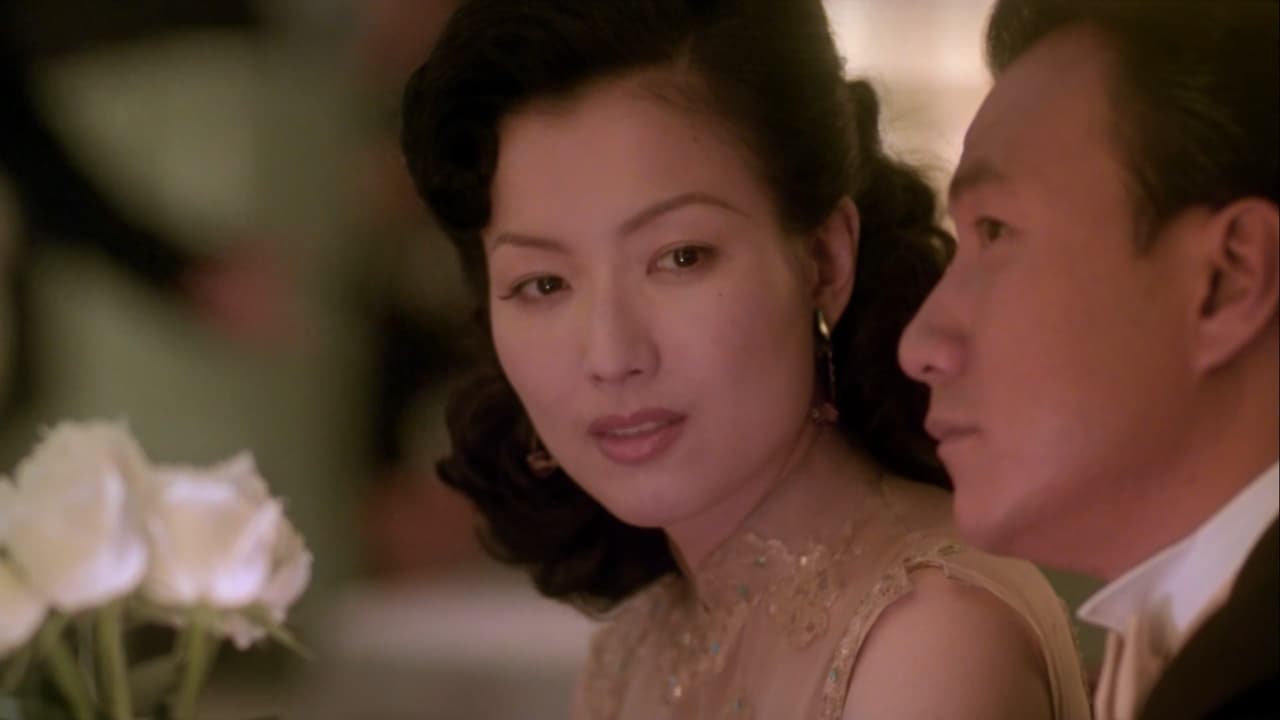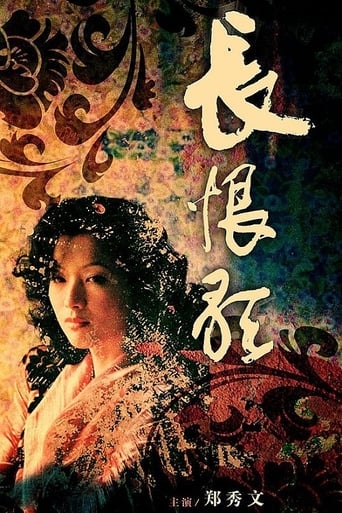



Purely Joyful Movie!
Dreadfully Boring
Blending excellent reporting and strong storytelling, this is a disturbing film truly stranger than fiction
View MoreStory: It's very simple but honestly that is fine.
Much was made of this film when it was being made. There was lots of hype, lots of speculation about Sammi's health during the filming and lots of disappointment and criticism when it was released. And not unfounded criticism.Sammi Cheng plays Qiyao a girl who became Miss Shanghai in the 1940s with the help of a photographer, Cheng (Tony Leung Ka-Fai) and becomes the mistress of a Nationalist general. Soon after, the Communists win the civil war and Li flees China, asking a friend to tell Qiyao that he is dead. Qiyao decides to stay in Shanghai and endures the new Communist regime that sweeps China. But her life isn't easy, she has a child with a young businessman, Ming (Daniel Wu), who is force to ditch his responsibilities as a father, and much later a whirlwind but disastrous relationship with a young man, Kela (Huang Jue).Sammi Cheng had chosen to take this movie to mark a change in her acting career, moving away from her famous romantic comedies of the past. So, there was an eager expectation of a star performance, only let down by the movie's poor script and storyline.The plot feels a little chewed up, unsurprisingly, I guess, as it is an adaptation of a novel, but in the end you leave asking yourself what was the point of the story. It only just told of a life so sad most of the time as she jumped between repeated failures of her relationships. The men of her life were meant to reflect a period in the 40 years the film covers, but unfortunately these characters lacked depth in the final edit as their appearances were fleeting. It's all the more disappointing given the slow pace of the film.There is clearly an attempt to follow in the Wong Kar Wai ways of filming. Put in some beautiful sets, the gorgeous costumes and some imaginative camera-work. But unfortunately, they all fell short of the mark. The lack of anything that showed the city that the film referred to was an obvious omission. But despite the disappointment, there was one performance that did live up to the expectation.Tony Leung Ka-Fai (not to be confused with his more famous namesake, Tony Leung Chiu-Wai) is one of Hong Kong's finest and most experienced actors, and he steals the show with an assertive performance. So much so that he was awarded the Best Actor award for the Hong Kong Film Critics Awards.But his performance was just a glimmer of what could have been. For Sammi, I'm really disappointed as much criticism of the film was aimed at her, but really, she didn't have much to work with. And it is the lack of depth in the film that really let it down.One with many regrets.
View MoreThe film follows the life & story story of QiYao (Sammi) in ShangHai from 1940s till 1980s. Sammi able to play her part quite well as a naive innocent teen, lover, mother, and mature woman. But her Mandarin is horrible. It makes you wanna laugh especially when she is angry. This is what I find most distracting. Mostly she is portrayed with blank look. Maybe it is the gloomy life of the character QiYao, always tried to find a better man. The story is a bit slow. It can become boring in times. Nevertheless this is a classic. It takes the audience experiencing life in Shang Hai from its heyday to the rise of Communist and its gloomy communist days.
View MoreThere have been a few homages to romantic cities in the past, several remarkably similar to Stanley Kwan's new release starring Sammi Cheng as a perennial femme fatale. Now, that latter concept in itself should suffice in sending anyone following HK cinema to the hills. Sammi? Sultry screen siren? Regardless, off the bat it becomes immediately clear Sammi's no longer Sammi. She doesn't even look like herself anymore. Previously a slacker-generation mistress of comedy, Cheng's transformation courtesy of the makeup department reveals a wider aspect of her range, particularly in portraying various ages, and later in the movie you begin to appreciate her as an older version of herself. Not exactly the same can be said of this film in its entirety. It really wishes to be a Wong Kar Wai product mixed in with period décor and mood. Additionally, the generation-hop resembles what we've before seen in Kwan's own Center Stage, of which Everlasting Regret is practically a clone, albeit without the same zest and soul. Center Stage, with Maggie Cheung, has class and solidity enough for multiple entries, while this current romp fails to truly impress.The story declares its love of Shanghai early on with some rather obscure and flat quote going on about "if your city is no longer your city" and so forth, an instant warning sign seeing as it seems pretentious as opposed to meaningful.From then on, we follow Wang Qiyao (Sammi) through numerous travails dating from the late Nationalist period (1947) to circa Deng Xiaoping's reformation of mainland China (early 80's). The problem with all this is lack of a cohesive thread, as events often bounce along inexplicably, and the movie never reaches the same seamless integration a quality production aspires to provide. Consequently, viewers feel detached from their on screen counterparts, denied caring for Qiyao and her fellow characters through erratic, mundane storytelling.Some elements of ER click into place neatly, like stage design, props and makeup. But these technical dimensions often succeed in HK films while that elusive X factor flounders by the wayside. Here it happens again as we witness the heroine grow up and ascend Shanghai's ranks of glittering celebrities. Starting with the post-WWII, pre-communist heyday, Qiyao's simple beauty and sharp, if a bit cold, personality win her the love of several men, powerful as well as down to earth and honest. On the upside, Everlasting Regret never claims its main protagonist is either good or bad, apparently opting to have third parties make that judgment.Back to the men. There's Hu Jun as Officer Li, a government power broker that initiates Qiyao in the ways of sex, intrigue and seduction. Hu does well as always, his electricity and masculine appeal going the distance. Later, after Li vanishes as the PRC comes into being, we get excellent Tony Leung Ka Fai in a role worthy of his talent and experience. He plays Mr. Cheng, a fashion photographer responsible for discovering Qiyao in the first place. Contrary to Leung's recent embarrassment in The Myth, here he's back in form, faithfully rendering his character as it ages and matures.The two younger males that come to dominate much of Wang Qiyao's life aren't up to standards set by their seniors, we sadly must conclude, especially Daniel Wu. This guy may be getting too prolific for his own good, as in ER little of the usual panache associated with his work makes it to the fore. Wu depicts Qiyao's lover Ming, a sensitive individual with much less backbone than money, who feels the crunch of 1950's China. While mediocre in its portrayal, this part of the feature at least sheds light on a forgotten part of history, letting us know fun and normalcy didn't come to a complete end in 1949: according to Kwan, Shanghai was still very much a party place even after Mao and crew took over.A bit better is Huang Jue as Kela, a dashing youngster who falls for Qiyao even when the feeling's not entirely mutual. Kela symbolizes the turmoil of new China, as the country emerges from its Cultural Revolution mire and faces rekindled excitement mixed with greed, rife black markets, uncertainty and disorientation.There are a few good female supporting roles, namely newcomer Huang Yi (Brotherhood a couple years back and a bunch of mainland martial arts soaps) as Qiyao's rebellious daughter, and Su Yan, providing input and balance as Qiyao's schoolmate and best friend Lili. Su Yan's gorgeous face buoys her along nicely, but you can't help feel her Beijing opera-esquire OTT'ness goes against the grain of straight-faced dramas.Effectively, there's a haunting sensation pervading Everlasting Regret, as if the editing people were told to make it under 120 minutes, hence what strike us as gaps in the story. This sort of tilt results in most of the good stuff concentrated towards the end, as both Mr. Cheng and Qiyao (or Tony Leung and Sammi) showcase their true colors and shine through despite all the hurdles.Wish we could determine the same about the film proper. Aside from good execution on the part of its cast, Everlasting Regret doesn't attain any of its goals, at least the ones evident from demeanor and construction. It's not an epic, sweeping saga transcending time and space, nor a workable tear jerker. In fact, you'd be unique if any overt emotion welled in you while watching. This also includes boredom, for although by no means a resounding success, ER likewise doesn't constitute a failure.People with keen interest in Shanghai history may find more value in sitting down to watch it, as may be the case for Sammi nuts eager to scope their idol's evolution. For casual and seasoned movie buffs outside these two groups, Everlasting Regret presents much less of an incentive, and shouldn't take priority over other offerings as the case may be.
View MoreJust saw the movie at the Venice Film Festival and it was mediocre. My review is somewhat biased because the movie is most likely geared towards the Chinese market and my cultural knowledge of China is very limited hence I may have failed to culturally relate to the film. However, the film felt episodic, in a bad sense, and, probably for budgetary reasons, the action was as if in a vacuum in the sense that the characters were certainly impacted by the events surrounding them, the rise of communism and détente, or whatever you may call it. But, we never experience, either through documentary footage or through outside shots, what China was going through at the time. Thus, it's hard to place the characters in the history that surrounds them. In this sense, the movie felt like a play. The acting was decent, nevertheless the lead actress was only passable. After being saturated by the main characters, I felt almost coerced into feeling invested in their lives and thus was curious to see the ending. However, the ending failed to make for the remainder of the film.
View More